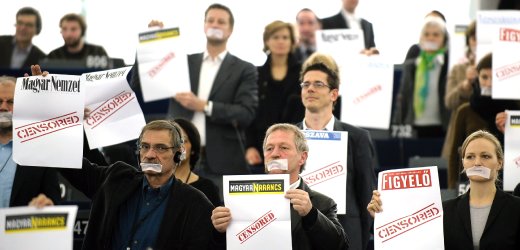
Hungarian Prime Minister Viktor Orbán was greeted with protests from some EU parliamentarians when he addressed them as its rotating president of the European Council.
Orbán began his speech to the European Parliament at 10:36 a.m. on Wednesday morning. He had hardly had time to greet the assembled deputies before being interrupted by European Parliament President Jerzy Buzek. A number of Green Party members of the European Parliament had taped their mouths shut with band aids while holding up placards reading "censored," as a protest against Hungary’s controversial new media law.
Orbán responded ironically, saying he was "pleased" that the sessions of the European Parliament did not lag behind those of the Hungarian parliament in their style. "I feel at home," he said.
Orbán knew what to expect when he made his appearance in Strasbourg. Even before he assumed the rotating presidency of the European Union on Jan. 1, members of the European Parliament (MEPs) had already vented their anger at Budapest. German MEP Alexander Graf Lambsdorff, a member of the liberal Free Democratic Party (FDP), warned of "authoritarian decay." The head of the Socialist group in the European Parliament, Martin Schulz, said Hungary was not worthy of the EU presidency, while Daniel Cohn-Bendit, a member of the European Parliament for the Green Party, said the Eastern European country was on track to become a "communist surveillance dictatorship."
Deutsche Welle’s Bernd Riegert notes that the controversy is likely to overshadow Hungary’s entire presidency, forestalling action on other items on Orbán’s agenda.
The "strong Europe" that Orban intends to promote during the Hungarian presidency cannot develop under such circumstances.
Orban wants to speed up Croatia’s EU membership by giving the Balkan country a firm date for its entry in to the bloc – his remedy for fighting expansion fatigue. That is a worthy goal, but Orban should bear in mind that Croatia would never be allowed to join if it, like Hungary, introduced a law that so obviously curbs freedom of the press.
It is a fundamental flaw in the EU’s setup. The bloc can decide who joins and who does not, but once a country is in, it can do precious little when a member leaves the path of political righteousness.
Presumably, this is the price for rapid expansion. Either the EU can limit its membership to fully modern states who have long internalized the principles of democratic governance or it can offer membership to emerging countries in hopes of enticing them down the right path.
In choosing the latter, Europe has doubtless hastened the pace of reform in Poland, Latvia, and other states formerly under the Communist thumb. But that means accepting growing pains among members of the club.
James Joyner is managing editor of the Atlantic Council. Photo credit: DPA/Spiegel.
Image: hungary-media-law-protest-eu-parliament.jpg
